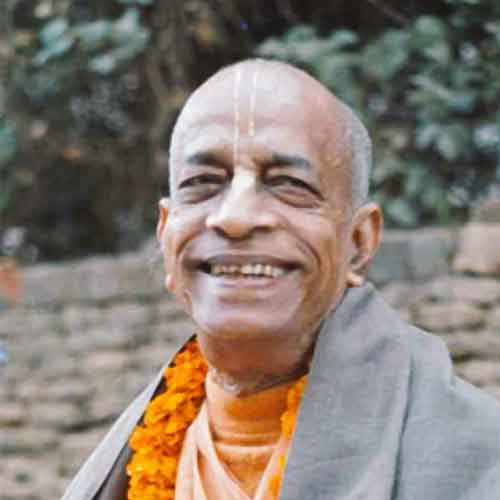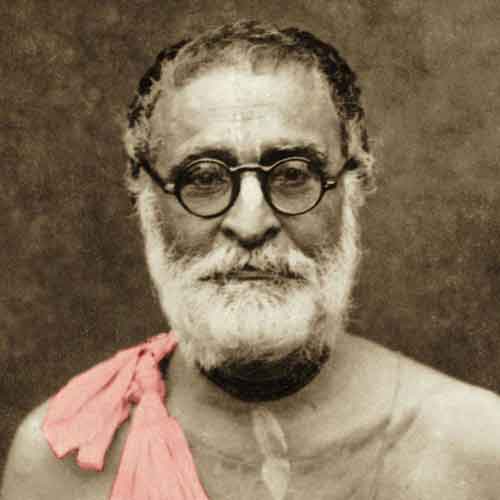When Śrīla Śrīdhara Mahārāja composed the Sanskrit prayer Śrīmad Bhaktivinoda Viraha Daśakam (‘Ten Prayers in Separation of Śrī Bhaktivinoda’) in the year 1936, Śrīla Bhaktisiddhānta Sarasvatī Ṭhākura expressed high appreciation for this composition. He said, “This poem is so fine, it is not written by him – it is written by Śrīla Bhaktivinoda Ṭhākura himself, and has come out through him. It is so appreciable.” After reading it he remarked about Śrīla Śrīdhara Mahārāja, “Now I am confident that we have one man who is qualified to uphold the standard of our Sampradāya!”
श्रीमद्भक्तिविनोदविरहदशकम्
Śrīmad Bhaktivinoda Viraha Daśakam
by Śrīla Bhakti Rakṣaka Śrīdhara Deva Gosvāmī Mahārāja
हा हा भक्तिविनोदठक्कुर! गुरो! द्वाविंशतिस्ते समा
दीर्घाद्दुःखभरादशेषविरहाद्दुःस्थीकृता भूरियम्।
जीवानां बहुजन्मपुण्यनिवहाकृष्टो महीमण्डले
आविर्भावकृपां चकार च भवान्श्रीगौरशक्तिः स्वयम् ॥१॥
hā hā bhaktivinoda ṭhākura guro dvāviṁśatis te samā
dīrghād-duḥkha-bharād aśeṣa-virahād duḥkhīkṛtā bhūr-iyam |
jīvānāṁ bahu-janma-puṇya-nivahākṛṣṭo mahīmaṇḍale
āvirbhāva-kṛpāṁ cakāra ca bhavān śrī-gaura-śaktiḥ svayam ||1||
hā hā – alas, alas; bhaktivinoda ṭhākura – Bhaktivinoda Thākura; guro – master; dvā-viṁśatiḥ – twenty-two; te – yours; samā – year; dīrghāt – for a long time; duḥkha-bharād – from the burden of suffering; aśeṣa-virahāt – from all absence; duḥkhī-kṛtā – the doer of difficulty; bhuh – earth; iyam – this; jīvānām – of beings; bahu-janma- many births; puṇya – pious; nivaha-ākṛṣṭaḥ – many attracted; mahī-maṇḍale – on the globe; āvirbhāva-kṛpām – manifested mercy; cakara – done; ca – and; bhavan – you; śrī-gaura-śaktiḥ – the energy of Śrī Gaura; svayam – himself.
Alas, alas! O Bhaktivinoda Ṭhākura, O supreme guru, for twenty-two years this world has been plunged into misfortune, long grief-stricken in your intolerable separation. You are the divine potency of Śrī Gaura, and you graciously made your advent in this earthly plane, being attracted by the living beings’ virtuous deeds performed throughout many lifetimes.
दीनोऽहं चिरदुष्कृतिर्न हि भवत्पादाब्जधुलिकणा
स्नानानन्दनिधिं प्रपन्नशुभदं लब्धुं समर्थोऽभवम्।
किन्त्वौदार्य्यगुणात्तवातियशसः कारुण्यशक्तिः स्वयं
श्रीश्रीगौरमहाप्रभोः प्रकटिता विश्वं समन्वग्रहीत् ॥२॥
dīno’haṁ cira-duṣkṛtir na hi bhavat-pādābja-dhūlī-kaṇā-
snānānanda-nidhiṁ prapanna-śubhadaṁ labdhaṁ samartho’bhavam |
kintv audārya-guṇāt tavāti-yaśasaḥ kāruṇya-śaktiḥ svayaṁ
śrī-śrī-gaura-mahāprabhoḥ prakaṭitā viśvaṁ samanvagrahīt ||2||
dīnaḥ – miserable; aham – I; cira – long’ duṣkṛtiḥ – wicked; na – no; hi – certainly; bhavat-pāda-abja – your lotus foot; dhūlī – powder; kaṇā – eye; snāna – bathing; ānanda – bliss; nidhim –the ocean; prapanna-śubha-dam – bringing blessings to the surrendered; labdham – achieved; samarthaḥ – suitable; abhavam – was; kintu – but; audārya-guṇāt – because of the mode of generosity; tava – yours; ati-yaśasaḥ – because of great grace; kāriṇya-śaktiḥ – energy of mercy; svayam – himself; śrī-śrī-gaura-mahāprabhoḥ – Śrī Śrī Gaura Mahāprabhu; prakaṭitā – revealed (energy of compassion); visvam – everyone; samanvagrahīt – gracious.
Since I am lowly and very wretched, it was not my luck to reach the ocean that bestows the fortune of surrender—the ocean of the ecstasy of bathing in a particle of the dust of your holy lotus feet. Yet due to your magnanimous nature, you gave your grace to the whole universe, personally revealing your super-eminence as the personification of the mercy potency of Śrī Gaurāṅga. (That is, by coming into this world, I received his grace.)
हे देव! स्तवने तवाखिलगुणानां ते विरिञ्चादयो
देवा व्यर्थमनोरथाः किमु वयं मर्त्त्याधमाः कुर्म्महे।
एतन्नो विबुधैः कदाप्यतिशयालङ्कार इत्युच्यतां
शास्त्रेष्वेव “न पारयेऽहम्” इति यद्गीतं मुकुन्देन तत् ॥३॥
he deva! stavane tavākhila-guṇānāṁ te viriñcādayo
devā vyartha-manorathāḥ kim u vayaṁ martyādhamāḥ kurmahe |
etan no vibudhaiḥ kadāpy atiśayālaṅkāra ity ucyatāṁ
śāstreṣv eva na pāraye’ham iti yad gītaṁ mukundena ca ||3||
he gave! – Oh, sir !; stavane – in your exaltation; tava – yours; akhila-guṇānām – of full-qualities; te – yours; viriñca-ādayaḥ – Brahmā and the others; devāḥ – demigods; vyartha-manorathāḥ – vain desires; kim u – how much more; vayam – we; martya-adhamāḥ – mortal vices ; kurmahe – we do; etad – this; na u – no; vibudhaiḥ – by scholars; api – never; atiśaya-alaṅkāraḥ – an excessive phrase; iti – thus; ucyatām – to lovers, collectors; śāstreṣu – in the scriptures; eva – certainly; na – no; pāraye – suitable, appropriate; aham – I; iti – thus; yad – that; gītam – singing; mukundena – by Mukunda; ca – and.
O Lord, even all the demigods headed by Lord Brahmā feel frustrated by their inability to (fittingly) sing the glories of all your divine qualities. What, then, can be said of the attempt of a fallen soul, a mere human like me? Surely, the learned will never waste their eloquent words eulogising this statement, since even the Supreme Personality of Godhead, Śrī Kṛṣṇa Himself, has sung in the scriptures His celebrated confession, “Na pāraye ’ham: I am unable (to reciprocate your devotion).”
धर्म्मश्चर्म्मगतोऽज्ञतैव सतता योगश्च भोगात्मको
ज्ञाने शून्यगतिर्जपेन तपसा ख्यातिर्जिघांसैव च।
दाने दाम्भिकताऽनुरागभजने दुष्टापचारो यदा
बुद्धिं बुद्धिमतां विभेद हि तदा धात्रा भवान्प्रेषितः ॥४॥
dharmaś carma-gato’jñataiva satatā yogaś ca bhogātmako
jñāne śūnya-gatir japena tapasā khyāti-jighāṁsaiva ca |
dāne dāmbhikatānurāga-bhajane duṣṭāpacāro yadā
buddhiṁ buddhimatāṁ bibheda hi tadā dhātrā bhavān preṣitaḥ ||4||
dharmaḥ – virtue; carma-gataḥ – relating to the skin; ajñata – ignorance; eva – certainly; satata – holiness; yogaḥ – yoga; ca – and; bhoga-ātmakaḥ – of a pleasurable nature; jñāne – in knowledge; śūnya-gatiḥ – emptiness; japena – by chanting mantras; tapasā – by penance; khyāti-jighāmsā – fame and desire for destruction; eva – certainly; ca – and; dāne – in the bestowal; dāmbhikatā – hypocrisy; anurāga-bhajane – in insistent worship; duṣṭa-apacāraḥ – sinful wrong-doing ; yada – when; buddhim – intellect; buddhimatām – of the intelligent; bibheda – divided, crushed; hi – certainly ; tadā – then; dhātrā – by the Creator; bhavan – you; preṣitaḥ – sent.
At a time when religion was evaluated in terms of bodily relationship, saintliness was determined by ignorance, and yoga practice was motivated by sensual pleasure; when scholarship was cultivated just for voidism, japa was conducted for the sake of fame, and penance was performed out of vindictiveness; when charity was given out of pride, and on the pretext of spontaneous devotion the most gross, sinful acts were perpetrated—and in all such anomalous situations even the intelligentsia were at loggerheads with one another … at that very time, you were sent by the almighty Creator.
विश्वेऽस्मिन्किरणैर्यथा हिमकरः सञ्जीवयन्नोषधीर्
नक्षत्राणि च रञ्जयन्निजसुधां विस्तारयन्राजते।
सच्छास्त्राणि च तोषयन्बुधगणं सम्मोदयंस्ते तथा
नूनं भूमितले शुभोदय इति ह्लादो बहुः सात्वताम् ॥५॥
viśve’smin kiraṇair yathā himakaraḥ sañjīvayann oṣadhīr
nakṣatrāṇi ca rañjayan nija-sudhāṁ vistārayan rājate |
sac-chāstrāṇi ca toṣayan budha-gaṇaṁ sammodayaṁs te tathā
nūnaṁ bhūmi-tale śubhodaya iti hlādo bahuḥ sātvatām ||5||
viśve – in the universe; asmin – in this; kiraṇaiḥ – with moon rays; yathā – how; himakaraḥ – “cooling” (Moon); sañjīvayan – nourishes; oṣadhīḥ – plants; nakṣatrāṇi – stars; ca – and; rañjayan – painter, colorant; nija-sudhām – his own nectar; vistārayan – expansive; rājate – of the sun; sat-chāstrāṇi – the scriptures; ca – and; toṣayan – satisfying; budha-gaṇam – the community of sages; sammodayan – pleasing; te – yours; tathā – so; nunam – certainly; bhumi-tale – on earth; śubha-udayaḥ – blessed appearance; iti – thus; hlādaḥ – happiness; bahuḥ – many; satvatam – of the faithful.
As the universally cooling moon is beautified by diffusing its nectarean rays, nourishing the plants and inciting the twinkling of the stars, your holy advent in this world is similarly ascertained as satisfying the pure devotional scriptures (through profound study) and blessing the learned with full-blown happiness (by the perfect axiomatic conclusions descending in divine succession). With your appearance, the ecstasy of the devotees knows no bounds.
लोकानां हितकाम्यया भगवतो भक्तिप्रचारस्त्वया
ग्रन्थानां रचनैः सतामभिमतैर्नानाविधैर्दर्शितः।
आचार्य्यैः कृतपूर्व्वमेव किल तद्रामानुजाद्यैर्बुधैः
प्रेमाम्भोनिधिविग्रहस्य भवतो माहात्म्यसीमा न तत् ॥६॥
lokānāṁ hita-kāmyayā bhagavato bhakti-pracāras tvayā
granthānāṁ racanaiḥ satām abhimatair nānāvidhair darśitaḥ |
ācāryaiḥ kṛta-pūrvam eva kila yad rāmānujādyair budhaiḥ
premāmbho-nidhi-vigrahasya bhavato māhātmya-sīmā na tat ||6||
lokānām – of the worlds; hita-kāmyayā – by the desire for goodwill; bhagavataḥ – to the exalted lord; bhakti-pracāraḥ – preaching devotion; tvayā – by you; granthanam – of volumes; racanaiḥ – with writings; satam – of the saints; abhimataiḥ – with loved ones ; nānāvidhaiḥ – with many kinds; darśitaḥ – shown; ācāryaiḥ – by the ācāryas ; kṛta-purvam – done earlier; eva kila – certainly; yad – who; rāmānuja-ādyaiḥ – by Rāmānuja, and by others; budhaiḥ – by the sages; prema-ambhas-nidhi-vigrahasya – in the form of the ocean of love; bhavataḥ – yours; māhātmya-sīmā – the limit of his glorification; na – none; tat – the.
By writing many books and by multifarious methods recognised by the pure devotees, you have demonstrated the preaching of pure devotional service unto the Supreme Lord, for the benefit of the whole world. We have heard of similar achievements in previous times by stalwart scholars such as Śrī Rāmānuja and many other ācāryas; but the glory of you—the very embodiment of the nectar of divine love—does not end (cannot be confined) here.
यद्धाम्नः खलु धाम चैव निगमे ब्रह्मेति संज्ञायते
यस्यांशस्य कलैव दुःखनिकरैर्योगेश्वरैर्मृग्यते।
वैकुण्ठे परमुक्तभृङ्गचरणो नारायणो यः स्वयं
तस्यांशी भगवान्स्वयं रसवपुः कृष्णो भवान्तत्प्रदः ॥७॥
yad-dhāmnaḥ khalu dhāma caiva nigame brahmeti saṁjñāyate
yasyāṁśasya kalaiva duḥkha-nikarair yogeśvarair mṛgyate |
vaikuṇṭhe para-mukta-bhṛṅga-caraṇo nārāyaṇo yaḥ svayaṁ
tasyāṁśī bhagavān svayaṁ rasa-vapuḥ kṛṣṇo bhavān tat-pradaḥ ||7||
yad-dhāmnaḥ – which belongs to the abode; khalu – certainly; dhāma – radiance; ca – and; eva – certainly; nigame – in defense; brahma – Brahma; iti – thus; saṁjñāyate – is called; yasya – whose; aṁśasya kalā – a fragment of part; eva – certainly; duḥkha-nikaraiḥ – with multitudes of suffering; yoga-īśvaraiḥ – by yoga masters; mṛgyate – is being researched; vaikuṇṭhe – Vaikuṇṭha; para-mukta-bhṛṅga-caraṇaḥ – supreme liberated uterine foot; nārāyaṇaḥ – Nārāyaṇa; yaḥ – who; svayam – himself; tasya – his; aṁśī – part; bhagavān – the Exalted Lord; svayam – Himself; rasa-vapuḥ – the embodiment of spiritual tastes; kṛṣṇaḥ – Kṛṣṇa; bhavan – you; tat-pradaḥ – giving it.
Merely the effulgence of His divine abode has been designated by the title ‘Brahma’ in the Vedas, and only the expansion of an expansion of His expansion is sought after with great tribulation by the foremost yogis. The most exalted of the liberated souls shine resplendent as the bumblebees at His lotus feet. The primeval origin of even the original Śrī Nārāyaṇa who is the Lord of the spiritual sky above Brahman: He is the original Supreme Lord, the personification of all nectarean mellows—Śrī Kṛṣṇa —and He is the one that you give.
सर्व्वाचिन्त्यमये परात्परपुरे गोलोकवृन्दावने
चिल्लीलारसरङ्गिनी परिवृता सा राधिका श्रीहरेः।
वात्सल्यादिरसैश्च सेविततनोर्माधुर्य्यसेवासुखं
नित्यं यत्र मुदा तनोति हि भवान्तद्धामसेवाप्रदः ॥८॥
sarvācintya-maye parātpara-pure goloka-vṛndāvane
cil-līlā-rasa-raṅginī-parivṛtā sā rādhikā śrī-hareḥ |
vātsalyādirasaiś ca sevita-tanor mādhurya-sevā-sukhaṁ
nityaṁ yatra mudā tanoti hi bhavān tad-dhāma-sevā-pradaḥ ||8||
sarva-acintya-maye – full of all incomprehensible; parāt-para-pure – in a higher home; goloka-vṛndāvane – Goloka in Vṛndāvana; cit-lilā-rasa-raṅginī- parivṛtā – surrounded by those who are attracted to the flavors of spiritual pastimes; sā – he; radhika – Rādhikā; śrī-hareḥ – Śrī Hari; vātsalya-ādi-rasaiḥ – by His parents and other rasas; ca – and; sevita-tanoḥ – serving form; mādhurya-sevā-sukham – the happiness of loving service; nityam – always; yatra – where; mudā – pleasure; tanoti – covers; hi – certainly; bhavan – you; tad-dhāma-sevā-pradaḥ – the bestowal of the service of the abode.
Situated in the topmost region of the absolutely inconceivable spiritual sky is the holy abode of Śrī Vṛndāvana-dhāma, in the spiritual planet known as Goloka. There, surrounded by sakhīs, Śrīmatī Rādhikā revels in the mellows of divine pastimes. With great ecstasy, She expands the joy of loving sweetness in the service of Śrī Kṛṣṇa-candra, who is otherwise served in four relationships up to parenthood. You, O Ṭhākura Bhaktivinoda, can give us the service of that holy dhāma.
श्रीगौरानुमतं स्वरूपविदितं रूपाग्रजेनादृतं
रूपाद्यैः परिवेशितं रघुगणैरास्वादितं सेवितम्।
जीवाद्यैरभिरक्षितं शुकशिवब्रह्मादिसम्मानितं
श्रीराधापदसेवनामृतमहो तद्दातुमीशो भवान् ॥९॥
śrī gaurāṇumataṁ svarūpa-viditam rūpāgrajenādṛtam
rūpādyaiḥ pariveśitaṁ raghu-gaṇair-āsvāditam sevitam |
jīvādyair abhirakṣitaṁ śuka-śiva-brahmādi-sammānitam
śrī-rādhā-pada-sevanāmṛtaṁ aho tad-dātum īśo bhavān ||9||
śrī gaura-aṇumatam – given by Gaura (agreed, loved, approved); svarūpa-viditam – understood by Svarūpa; rūpa-agrajena – by the brother of Rūpa; ādṛtam – exalted; rūpa-ādyaiḥ – by the followers of Rūpa; pariveśitam – served; raghu-gaṇaiḥ – by the followers of Raghunātha Dāsa; asvāditam – tasted; sevitam – educated, worshiped; jīva-ādyaiḥ – by the followers of Jīva; abhirakṣitaṁ – protected; śuka-śiva-brahma-ādi – by Śuka, Śiva, Brahmā and others; sammānitam – appreciated; śrī-rādhā-pada-sevana-āmṛtaṁ – the nectar of worship of the feet of Śrī Rādhā; aho – oh; tad-datum – to give it; īśaḥ – god, master; bhavān – you.
The internal purport is known to Śrī Svarūpa Dāmodara by the sanction of Śrī Gauracandra, of that which is adored by Śrī Sanātana Gosvāmī and distributed by the preceptors realised in transcendental mellows, headed by Śrī Rūpa Gosvāmī; that which is tasted and enhanced by Śrī Raghunātha Dāsa Gosvāmī and followers and carefully protected by the votaries headed by Śrī Jīva Prabhu; and that which (from a respectful distance) is venerated by great personalities such as Śrī Śuka, Lord Śiva, the chief of the demigods, and Lord Brahmā, the grandfather of all beings—O wonder of wonders! the nectarean rapture of servitude unto Śrī Rādhikā—that, too, you can give us
क्वाहं मन्दमतिस्त्वतीवपतितः क्व त्वं जगत्पावनो
भो स्वामिन्कृपयापराधनिचयो नूनं त्वया क्षम्यताम्।
याचेऽहं करुणानिधे! वरमिमं पादाब्जमूले भवत्
सर्व्वस्वावधिराधिकादयितदासानां गणे गण्यताम् ॥१०॥
kvāhaṁ manda-matis tv atīva patitaḥ kva tvaṁ jagat-pāvanaḥ
bho svāmin kṛpayāparādha-nicayo nūnaṁ tvayā kṣamyatām |
yāce’haṁ karuṇā-nidhe varam imaṁ pādābja-mūle bhavat-
sarvasvāvadhi-rādhikā-dayita-dāsānāṁ gaṇe gaṇyatām ||10||
kva – where; aham – I; manda-matiḥ – in a foolish sense; tu – and; atīva-patitaḥ – very fallen, depraved; kva tvam – where are you; jagat-pāvanaḥ – the purifier of the world; bho svāmin – oh, master!; kṛpayā – please; aparādha-nicayaḥ – a multitude of sins; nunam – certainly; tvayā – by you; kṣamyatām – be forgiven; yace – I beg; aham – I; karuṇā-nidhe – ocean of mercy!; vara – grace; imam – this; pāda-abja-mūle – in the lotus-root of the feet; bhavat-sarvasva-avadhi – your dignity is all-boundary; rādhikā-dayita-dāsānām – of the dear servants of Rādhikā; gaṇe – in a group; gaṇyatām – be listed!
Where am I, so lowly and fallen, and where are you, the great soul who delivers the universe! O Lord, by your grace, you are sure to forgive my offenses. O ocean of mercy, in the dust of your lotus feet I pray for just this benediction: kindly make my life successful by recommending me for admission into the group of Śrī Varṣabhānavī Dayitā Dāsa, who is the dearmost one in your heart.











